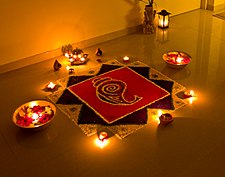Diwali
Diwali (also: Deepawali)[2] is one of India's biggest festivals. The word 'Deepawali' means rows of lighted lamps. It is a Festival of Lights, and Hindus celebrate it with joy.[3] During this festival, people light up their houses and shops with small cup-shaped oil lamps made of baked clay. They worship the Lord Ganesha and Goddess Lakshmi for welfare and prosperity. It marks the beginning of a new year. People clean and decorate their houses before the festival. They make colorful rangoli art on floors with colourful rice and flowers
| Diwali / Dipavali /Deepavali | |
|---|---|
 Rangoli decorations, made using coloured powder, are popular during Diwali | |
| Observed by | Hindus, Sikhs, Jains and Buddhists[1] |
| Type | Indian, Cultural, Seasonal |
| Begins | Dhanteras, 2 days before Diwali |
| Ends | Bhai Dooj, 2 days after Diwali |
| Date | Kartik Amavasya (Varies per Hindu Lunisolar calendar) |
| 2023 date | 12 November (Sunday) |
| 2024 date | 6 November (Monday) |
| Celebrations | Diya and lighting, home decoration, shopping, fireworks, puja (prayers), gifts, performing religious rituals, feast and sweets |
| Related to | Kali Puja, Diwali (Jainism), Bandi Chhor Divas |
Deepawali is celebrated and is a public holiday in India. Shops, school, offices and temples are thoroughly cleaned, whitewashed and decorated with lights, flowers and oil lamps. On the day of Deepawali, people wear new clothes and exchange greetings, gifts and sweets with their loved ones.
At night, buildings are illuminated with earthen lamps, candles and lights. People buy sweets for their families and also send them as presents to their friends and relatives. The Goddess Lakshmi is also worshiped in the form of silver coins. Hindus believe that, on this day, Lakshmi enters houses which are neat and tidy. People offer prayers for their own health, wealth and prosperity. They leave the lights on in their homes to welcome Lakshmi with happiness.
Diwali is one of the most important festivals of Hindus. It comes on Amavasya in the month of Kartik. People prepare lots of sweets with their oil. People light diyas and burn crackers. They exchange greetings and sweets.
References
change- ↑ Charles M Townsend, The Oxford Handbook of Sikh Studies, Oxford University Press, ISBN 978-0199699308, page 440
- ↑ Mead, Jean (February 2008). How and why Do Hindus Celebrate Divali?. Evans Brothers. ISBN 978-0-237-53412-7.
- ↑ Ramnarine, Tina K. (2013-10-18). Musical Performance in the Diaspora. Routledge. ISBN 978-1-317-96956-3.
Other websites
change- The Ancient Origins of Diwali, India’s Biggest Holiday, Becky Little (2017)